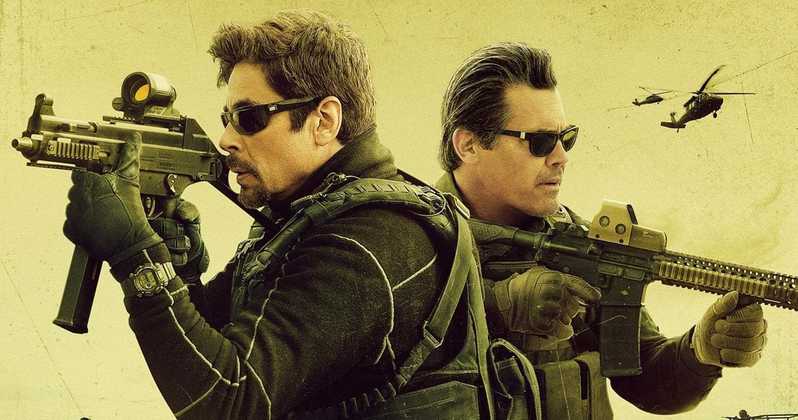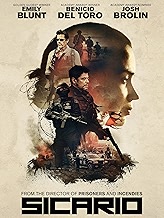There are often several clues as to whether the sequel will stand up to its originator: retaining stars not only the basest of evaluators. Sicario: Soldado retains two of the three lead roles from Sicario, with Josh Brolin and Benicio Del Toro reprising their characters of Matt Graver and Alejandro, respectively.
Emily Blunt, however, does not return as Kate Macer, though this appears to be a conscious decision. With the sequel announced within a month of the original’s premiere, Blunt was attached to the film until the writer, Taylor Sheridan, chose to omit her character from the screenplay for the sequel, saying that her part of the story was complete after Sicario, and you can agree with that as by the end of the film she is a quivering and useless wreck, used up by Graver and Alejandro.
Another positive for the sequel comes in the form of Sheridan, though arguably a novice at the point of writing Sicario, there is consistency in that he is the sole credit for writing both films.
Having said this, the kiss of death for any sequel is failing to retain the director, and that is, unfortunately, the case here, with Denis Villeneuve – who directed Sicario – unable to sign on to direct the sequel due to scheduling conflicts as he had already been attached to direct Blade Runner 2049.
That left Stefano Sollima to be brought on to direct Sicario: Soldado, whose prior directorial achievements lie entirely in Italian film and television.
Where the relationship between Macer, Graver, and Alejandro is so crucial to the storyline in the first film, with Macer acting as the conscience throughout the movie.
Lacking the conscience would imply that Sicario: Soldado will be more direct blunt, there is no voice in either Graver or Alejandro’s heads telling them to consider the repercussions of their actions, or whether their behavior is by the book, or even morally right.
The central pair are entirely direct and to the point, not shrugging away from performing violent and heinous acts, such as when in Sicario Alejandro kills his long-time nemesis’ children and wife at the dinner table and invites him to finish his dinner before Alejandro inevitably kills him too.
Where Sicario retains a subtlety, it doesn’t need to show all the gratuitous violence, instead of leaving certain things to the imaginations of the audience. When it does show the effects of the drug cartels, specifically the hanging mutilated bodies outside Juarez, Mexico.
It is used to demonstrate the fragility and naivety of Macer. Sicario: Soldado takes a different direction, perhaps reflective of the styles of Graver and Alejandro. It chooses to embrace the chaos, embrace the violence, not shy away from it.
This is visible from the very opening of the film when the audience is treated to a front-row seat to a suicide bombing of a supermarket, including watching a mother and child attempt to slip past the bomber at the exact moment he detonates his vest.
The directly opposes the style of the first film, where though Alejandro kill the wife and children of his nemesis, it is not shown, instead, the camera focusses on Alejandro and his lack of expression whilst assassinating these innocents.
Sicario: Soldado is a blunt weapon and doesn’t shy away from that fact. As the audience learns early in the film Graver’s aim is to create a war between everybody, and the explosivity and chaos of this are shown throughout, including the kidnapping of Isabel Reyes (Isabela Moner).
She is dragged kicking and screaming as her guards and rivers are brutally murdered; all of which is done by Graver, Alejandro and their crew (supposedly on the side of the law), though this line is beyond blurred, it is virtually erased. The kidnapping is a ruse, Isabel is quickly ‘rescued’ by Alejandro as a ‘DEA agent’, not knowing he is, in fact, part of the team that kidnapped her in the first place.
Graver comes into a greater light in the sequel, his character having been arguably overlooked in favor of focussing on developing the characters of Macer and Alejandro. In Sicario: Soldado, Brolin gets the greater scope to develop Graver and his weaving along the line of the law.
This addressed one of the greatest weaknesses of the original. Where the film looks at the two sides of the law, and Macer and Graver represent the two consciences or ways of thinking, Macer is focussed on far greater than Graver.
This is perhaps because Macer represents the everyman and the point of view of the audience perhaps, but I felt that Graver’s character was not developed enough for his point of view to be understood.
In the sequel, without Macer, Graver and Alejandro control the point of view, the audience is forced to follow their conscious choices and their points of view. Thought his leads to a highly action-packed and brutal film, there is a huge contrast, both stylistically and emotionally between the two films.
Sicario sets Macer, and therefore the viewer, as having a moral point of view, and takes steps to break that in both Blunt’s character and the mind of the viewer. The film is a mental breakdown of Macer that leaves her questioning her moral compass and believing there is no way out other than the one set out by Graver and to a certain degree Alejandro.
Sicario: Soldado has none of the subtlety and emotional engagement of the first film. Instead, the central character for the viewer to focus on is Graver and the audience is therefore just treated to the chaos and carnage that he seeks to create.
There is little thought of the collateral damage that ensues, and as a viewer, you almost disbelieve that this is a real situation and what good could come out of what Graver and Alejandro are creating.








